To: chajin; henkster; CougarGA7; BroJoeK; central_va; Larry Lucido; wagglebee; Colonel_Flagg; Amagi; ...
We have three Burning Kansas excerpts set up and a larger allotment of Harper’s Magazine posts. I have book report this month as we catch up with William Tecumseh Sherman out in California. We also have an exciting new feature that will keep readers coming back for years to come. Let’s start it off with the August Harper’s Magazine.
During this period Harper’s issues were fairly long. This month’s is over 140 pages. I have prepared less than a quarter of that for posting. Keeping with the policy I used during the WWII series I will post the lead article in its entirety. I will also print the current events section, which seems to run about 3-5 pages. It seems like the next to last piece in each issue is a humorous pictorial sequence. God knows we need more humor, so that is in. I might as well finish with the concluding fashion pages, although the dresses I have seen so far all resemble giant elaborate lamp shades.
Beyond these standard items I will scour the rest of the magazine looking for items that might interest a few twenty-first century readers. The magazine contains a big selection of travel articles, literary reviews, fiction, poetry, science, and so on. In the middle of the magazine is a series sections named Editor’s table, Editor’s easy chair, and Editor’s drawer. Don’t ask me. Anyway, in the August Editor’s table I found a section about mechanical inventions of recent years that seemed interesting.
The cover of our August edition is a picture of Mount Holyoke in Massachusetts, which leads into a 14-page account of a pleasure trip beside the Connecticut River, beginning at Springfield, MA and proceeding straight north along the present day path of Interstate 91 to Windsor, VT. Along the way, as well as marveling at the wondrous scenery, we vicariously visit a musket factory and armory, a button factory, a school for ladies, and the Vermont Lunatic Asylum. I found it of interest that, during the visit to the armory, the tourists discovered that security for the 150,000 new muskets was practically nonexistent. The armory is in the middle of Massachusetts – hotbed of abolitionist activism – when arms are being smuggled into Bleeding Kansas by the crate load. I think I know where some of them come from.
The writing style took a little getting used as the language seems impossibly flowery, if that’s the word. I tried mentally translating it from 1856 English to 2016 English to better understand the literal meaning. That worked, but made me realize we may have lost something by going putting such a high value on economy of words and foregoing more creative use of the language. I guess we don’t have time for that now, what with the internet and being the most important generation ever to walk the earth and all. All the same, I suggest it is important to gain familiarity with the journalistic style of the period to better understand our American ancestors.
Current Events begins with a report on the results of the Republican National Convention in Philadelphia on June 17. The platform is summarized and the vote that resulted in the nomination of John C. Fremont of California and William L. Dayton of New Jersey as the presidential ticket is described. The American and Democratic Party nominees, Millard Fillmore and James Buchanan, respectively, think the Republican position on the extension of slavery in the territories is a bad idea.
Then follows a report from the House Kansas Investigation Committee and an update on events in that territory. It’s a mess. A Vigilance Committee is working to get rid of the riff-raff in San Francisco. (More on that in a couple days.) Mexico is working on a new constitution and may have a war with Spain. Costa Rica suffered greater than reported losses in its invasion of Nicaragua.
England has a new government and something going on with Central America. A peace treaty was concluded on Queen Victoria’s birthday. Palmer the poisoner was convicted and executed. France is suffering from severe flooding and their new Imperial Infant was baptized.
The Editor’s Table discusses American inventions in the context of a nation’s obligation to do its fair share of contributing to the global good. ET leads off with the lightning rod and the steamboat as two of the earliest. It goes on in detail, but let me just quote the penultimate paragraph:
To sum up, therefore, the United States, during the last eighty years, have endowed the world with the lighting-rod, the steamboat, the photograph, the electric telegraph, the discovery of the use of inhaled ether, the sewing machine; the best and cheapest farm implements, the best carpenters’ tools, the best locks fire-engines, nails, spikes, screws, and axes; the best fire-arms, the cheapest clocks, the fastest steamers and sailing vessels, the cheapest railroads, the lightest wagons, and many of the most useful labor-saving machines in almost every department of industry. If any nation, during the same eighty years, has done more, or as much the fact is not generally known.
The Harper’s post ends with the humor feature, Experiments in Photography, and the fashion pages.
2 posted on
08/01/2016 5:23:43 AM PDT by
Homer_J_Simpson
("Every nation has the government that it deserves." - Joseph de Maistre (1753-1821))
To: chajin; henkster; CougarGA7; BroJoeK; central_va; Larry Lucido; wagglebee; Colonel_Flagg; Amagi; ...
New feature!
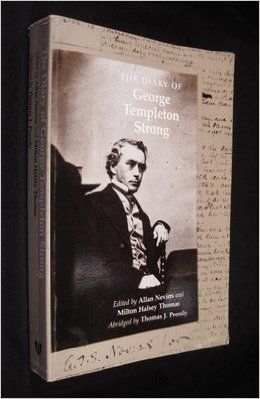
I first heard of George Templeton Strong on the Ken Burns Civil War series. His diary entries are featured throughout. It turns out he added to his diary “most days from 1835 to 1875.” I got a copy of the abridged diary from amazon and found that it is so abridged that it leaves out entire years, two of which are 1857 and 1858. That leaves me hankering to get the unabridged 4 volume set. That is kind of pricey ($200+) so it will have to wait a while as I ponder the situation. Meanwhile, I will present the surviving entries for 1856.
From the back cover:
Strong was an attorney by profession, and his diary reveals much about the practice of law in New York City, but he was also a trustee of Columbia University, a vestryman of Trinity Episcopal Church, a close follower of local, state, and national politics, and a lover of music who seems to have attended virtually every concert held in New York. His diary reflects all those interests and more. He comments on the accession of the young Queen Victoria to the British throne in 1837, just as he records the sufferings caused by the economic recessions, or his reaction upon reading Darwin’s On the Origin of Species in 1860, and his impressions when he meets Abraham Lincoln in 1862. Strong’s diary is of particular interest and value for his comments on the relations between North and South, and blacks and whites, since his changing opinions reflect closely the changing opinions of the majority of white Northern voters as registered in the elections of the era of Civil War and Reconstruction.
From the preface to the original edition (1952):
Fidelity to the text has, of course, involved the retention of many outspoken passages. Strong had a way of indulging, sometimes semi-humorously, sometimes quite seriously, in heated attacks on individuals, groups, and societies; he used the diary now and then to blow off steam. His violent assaults upon Yankees, Negroes, Southern rebels, Britons, Irishmen, Frenchmen; his scathing remarks about conservative Columbia trustees, Roman Catholics, Low-Church Episcopalians, Jews, Unitarians, Presbyterians, and other sects; his contemptuous excoriation of many of the cruder manifestations of social and political democracy – all this gives salt to the great document he left. Sometimes the salt may seem a little stinging. But if hasty and unfair judgments are included, it is not because the editors approve them, but because they have historical value. . .
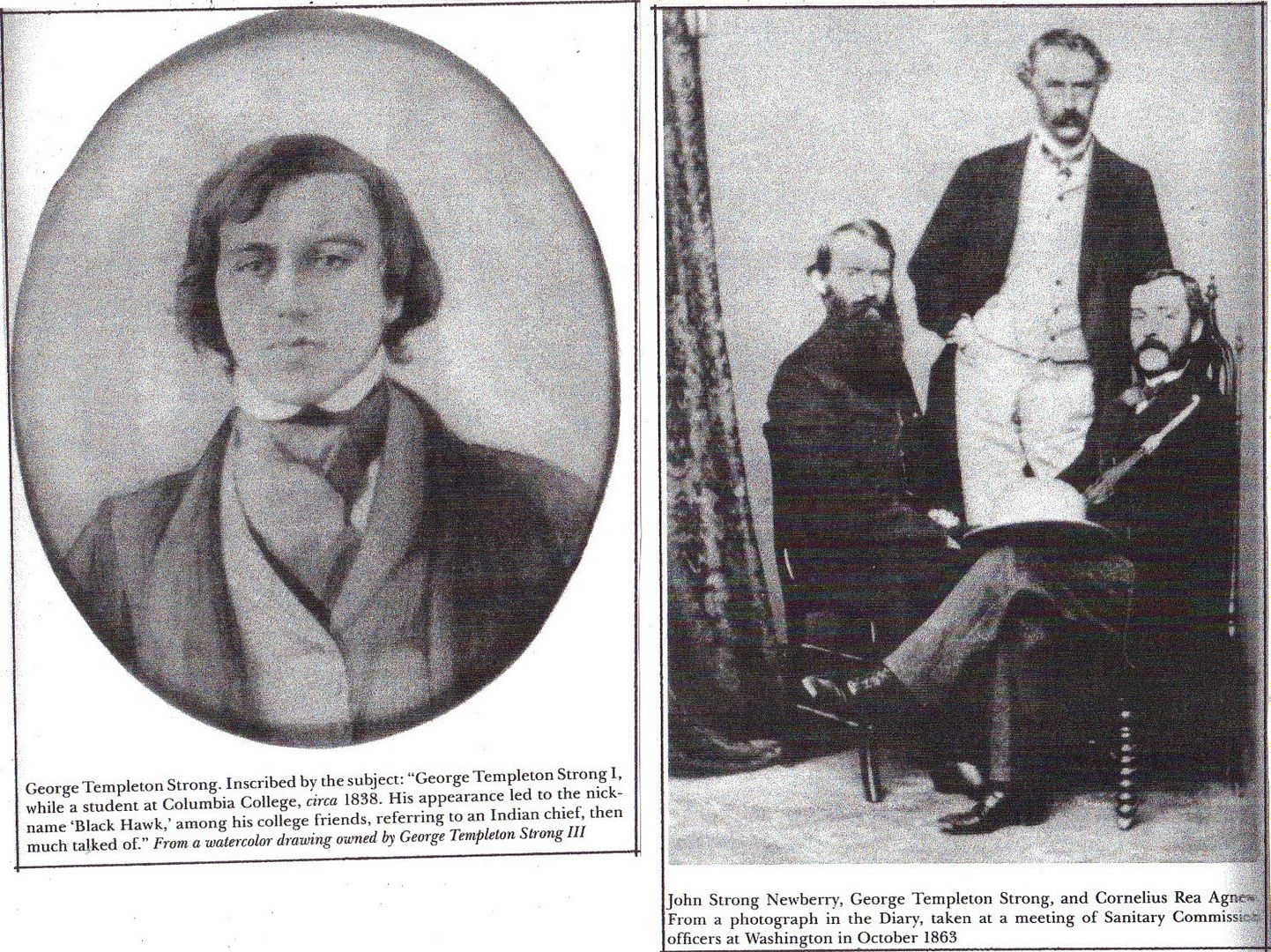
After all that our first entry may seem tame and anticlimactic. Strong describes how he provided negative assurance a (as I used to call it in the CPA business) after a bank examination.
August 1. Spent most of a day in the Trust Company with Ludlow and Moses Taylor, as a Committee of Examination. All correct and prosperous as far as we could discover, but such an investigation is little more than a formality. Six months’ hard work over ledgers and vouchers might enable us to report positively that Kearny and David Thompson had not cheated the company out of $100,000 or so but no less amount of labor is of any real use.
The Diary of George Templeton Strong, Edited by Allan Nevins and Milton Halsey Thomas, Abridged by Thomas J. Pressly
4 posted on
08/01/2016 5:27:03 AM PDT by
Homer_J_Simpson
("Every nation has the government that it deserves." - Joseph de Maistre (1753-1821))
To: chajin; henkster; CougarGA7; BroJoeK; central_va; Larry Lucido; wagglebee; Colonel_Flagg; Amagi; ...
Book report!
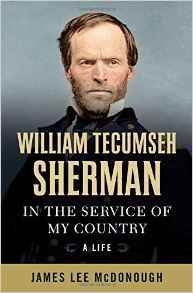
Of the few biographies I have now begun, I rank James L. McDonough’s of William Tecumseh Sherman below David Herbert Donald’s ‘Lincoln,’ Jean Edward Smith’s ‘Grant,’ and William J. Cooper Jr.’s ‘Jefferson Davis, American.’ I won’t compare it to the Douglas Southall Freeman bio of Lee because that one is an abridgement. I don’t give ‘William Tecumseh Sherman: In the Service of My Country’ low marks because of the scholarship. That seems to me perfectly adequate. It is because the author presents his information in a way that doesn’t flow as well as it does in the other. I suppose I could sum up my opinion by saying that McDonough is not as talented a writer as the other authors. I might not have arrived at that conclusion except that McDonough occasionally injects his opinions on matters not related to the subject as a way of explaining some point or other. I was relieved to learn that this tendency is mostly restricted to the early chapters.
That does not include the prologue. McDonough first introduces us to Sherman at the conclusion of the first day of the battle at Shiloh in April 1862. He describes briefly how Sherman made a serious mistake in allowing himself to be surprised by the confederate attack, but then rallied and took the steps necessary to prevent a union defeat that day. McDonough repeats the celebrated exchange between Sherman and Grant that night:
“Well Grant,” said Sherman, “we’ve had the devil’s own day, haven’t we?” “Yes,” replied Grant; “lick ‘em tomorrow, though.”
The author explains that Grant was not just exhibiting bravado or attempting to shore up his subordinate’s morale, but was giving a cool estimate of the situation based on the facts.
This may have been the first time I have read a detailed historical account of a civil war battle, and the way McDonough does it had me hooked from the beginning. I may yet find myself tramping around an old battlefield or two looking for familiar landmarks and retracing the action. That gives me some confidence that McDonough will stick to business when we get to the war years and he can focus on his true area of expertise.
Sherman was born February 8, 1820 in Lancaster, Ohio to Charles Robert and Mary Sherman. His father named him Tecumseh – without the William – because he was an admirer of the Shawnee warrior. The William was added at either one of his two baptisms; the first Presbyterian and then as a Roman Catholic. (As far as RC doctrine goes, the second one was redundant.) Sherman’s young siblings pronounced Tecumseh as “Cump,” and that became his enduring family nickname. Sherman’s father died when he was 9 and the boy was raised by Charles Sherman’s close friend Thomas Ewing. Ewing was influential in national Whig politics and would become Treasury Secretary in the administration of William Henry Harrison. 20-year-old William T. Sherman found the election of 1840 so unsavory that he was permanently turned against politics as a career and politicians in general. He harbored similar opinions about lawyers and bankers. Ironically, he would eventually work as a banker and in a law firm.
Ewing helped Sherman get an appointment to West Point, where he graduated high in the class of 1840. His pre-Civil War military career did not proceed like those of the other West Point Grads I have read about. He spent no time on the north or northwestern frontier centered around the Mississippi River Valley. Instead he stayed in the southeast for an extended period. His first assignments were to Florida bases, where he took part in a sluggish guerrilla war against aimed at displacing the Seminole Indians from their homeland in the Florida peninsula and moving them to the west. He then served in coastal defenses at Mobile Bay and in June 1842 at Ft. Moultrie in Charleston Harbor. In the latter he was attached to Co. G, 3rd Artillery, commanded by Capt. Robert Anderson. Sherman considered that type of duty tedious and was relieved when hostilities with Mexico commenced and he was ordered to California.
Sherman sailed from New York in July 1846 and after a grueling 6-month journey arrived at Monterey, California in January 1847. He was devastated to learn that there was no fighting going on in California. At this point the biography developed into local news for me. Sherman spent over a year in Monterey and did a lot of exploring in the region. He kept horses for hunting expeditions in the hills around the Carmel Valley and once rode with an army friend to San Juan Bautista to view the mission there. (Mrs. Homer will be dining with friends in San Juan Bautista this [July 31] evening.) When gold was discovered in 1848 Sherman was sent to Sutter’s Fort near Sacramento to appraise the situation in the gold fields. In January 1850 left on a mission to report to General Winfield Scott in New York. The return trip only took a month because he crossed the isthmus of Panama rather than going around Cape Horn.
All during Sherman’s time at West Point and throughout his army career he kept up an intense correspondence with his foster sister, Ellen Ewing. Even though he greatly enjoyed the company of ladies and was a keen observer of feminine charm he never (that we know of) became involved in romantic affairs. He and Ellen developed an understanding that they would wed at some point. That finally happened on May 1, 1850. It was quite a notable Washington affair. Guests included Henry Clay, Daniel Webster and President Zachary Taylor. Nevertheless, if Sherman had asked me I would have advised against it. He and Ellen had little by way of common interests. She was devoted to her family in Ohio. She was obedient to her highly influential and wealthy father. She shared her mother’s intense Roman Catholic faith. She disliked Sherman’s choice of a military career and loathed California, preferring to remain at the Lancaster, Ohio homestead. Sherman, on the other hand was determined to stay out of his father-in-law’s shadow and make his own way. He was irreligious. He loved the army and came to feel much at home in California. Another consideration was the fact that the couple, while not actually brother and sister, had something of that same kind of family relationship. So her parents never lost a proprietary feeling towards their daughter or their grandchildren, when those began to arrive. Finally, Ellen was never persuaded that she shouldn’t have her own way on any point of disagreement. So William T. Sherman suffered a great deal of anxiety over his marriage.
In September 1850 Sherman received a long-awaited promotion to Captain and was sent to Jefferson Barracks, near St. Louis, where he reported to Captain Braxton Bragg. Shortly thereafter he went to New Orleans in order to clean up corruption in the commissary department there. It was there he was offered a job with a banking concern that wanted him to open a branch in San Francisco. He accepted the offer and on September 3, 1853 he resigned from the army. He moved with his family (except for a daughter who remained with the Ewings in Ohio) to San Francisco and became a banker. According to this account he was good at it and his operation prospered. He became a well-known and respected citizen of San Francisco, even becoming Vice President of the company that built the first railroad in the state of California, east from Sacramento to the Sierras, eventually to become part of the Central Pacific Railroad. His major problem during these years was severe asthma, which got so bad he thought it would cause his death. The author speculates that it was at least partly due to stress related to his tense marriage.
That is where the first excerpt from the biography takes up. Things are going fairly well for the future general but trouble is looming.
1
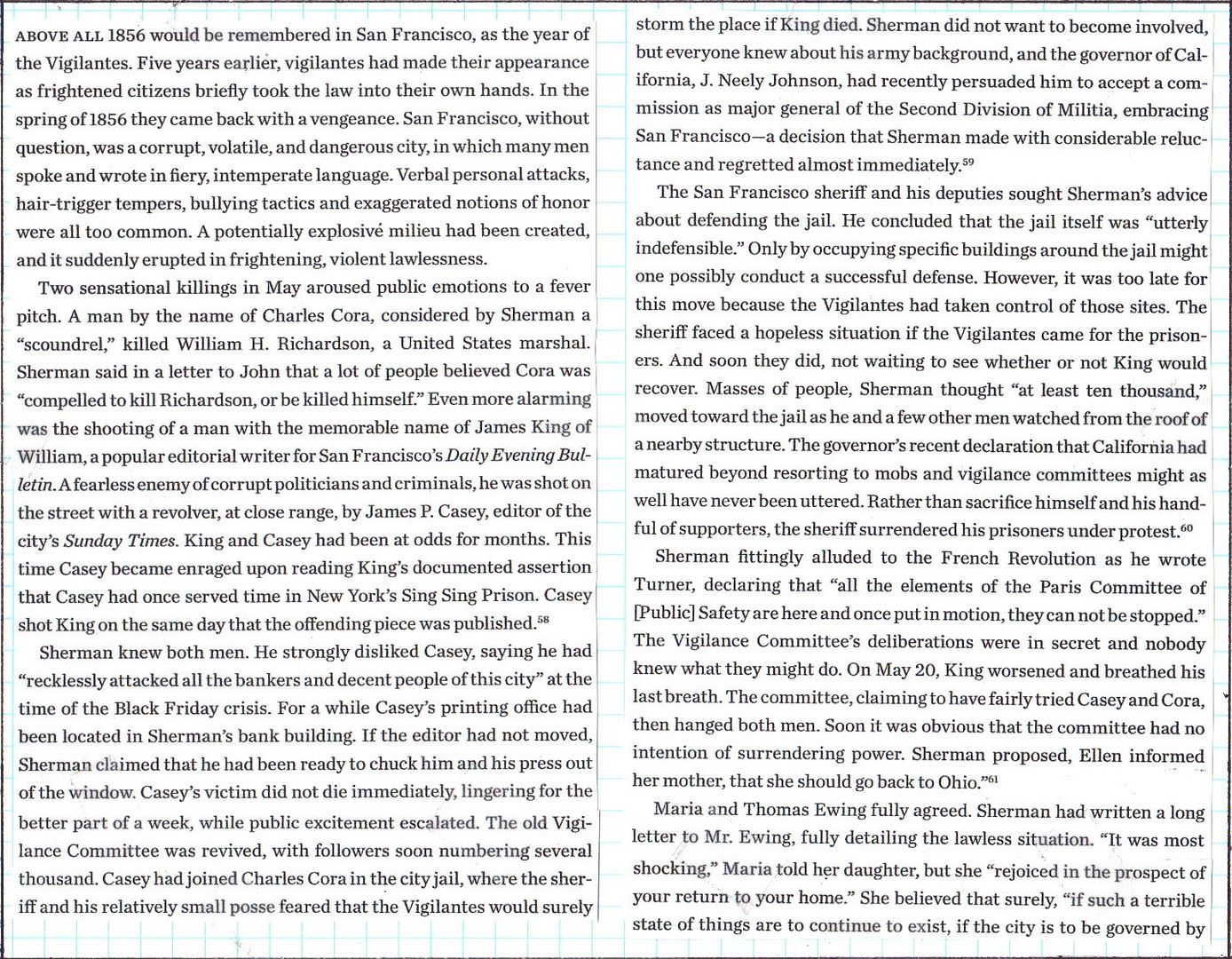
2
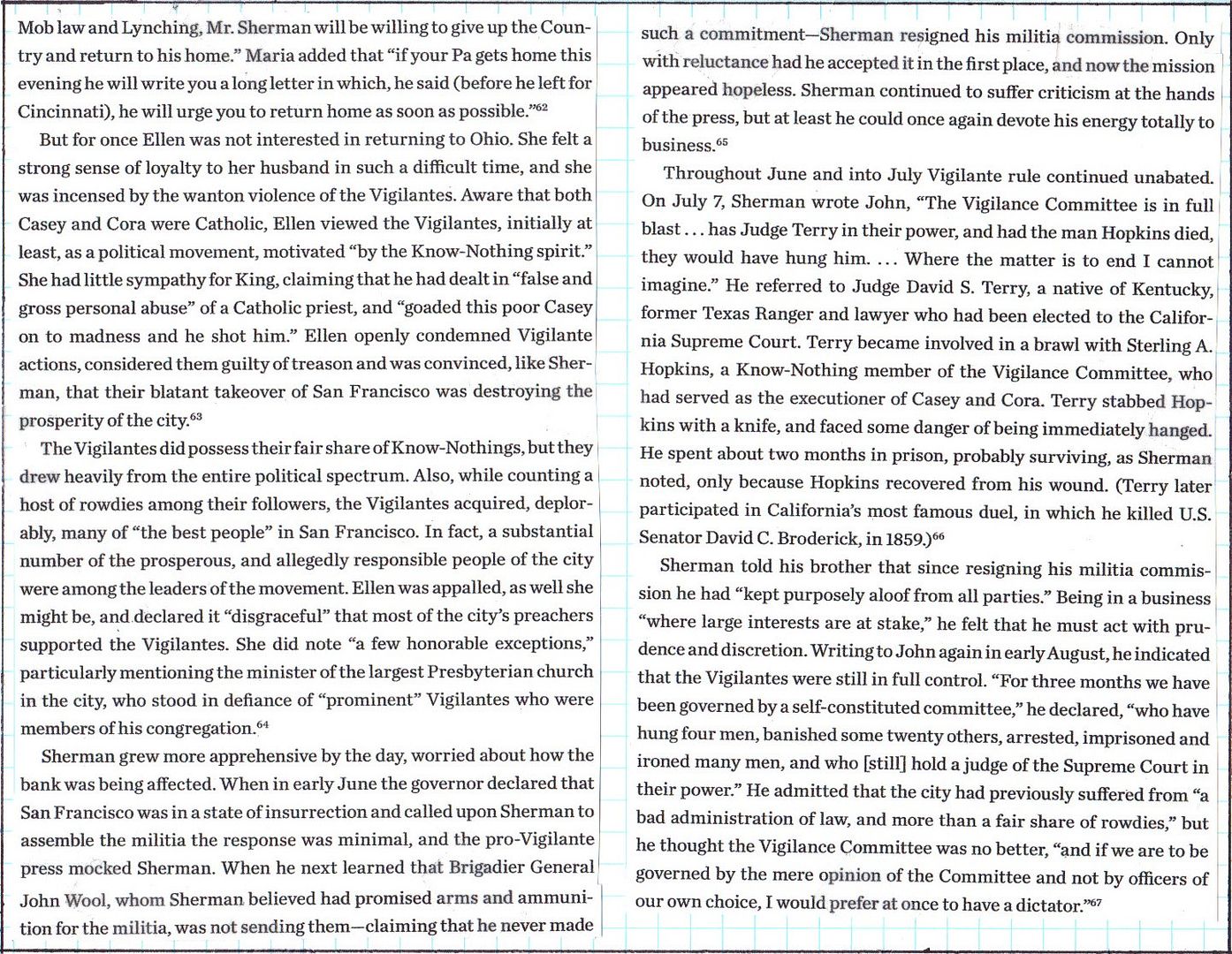
James Lee McDonough, William Tecumseh Sherman: In the Service of My Country, A Life
5 posted on
08/03/2016 5:26:18 AM PDT by
Homer_J_Simpson
("Every nation has the government that it deserves." - Joseph de Maistre (1753-1821))
To: chajin; henkster; CougarGA7; BroJoeK; central_va; Larry Lucido; wagglebee; Colonel_Flagg; Amagi; ...
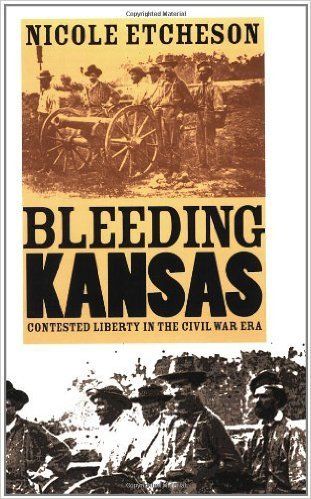
Continued from July 28 (reply #62)
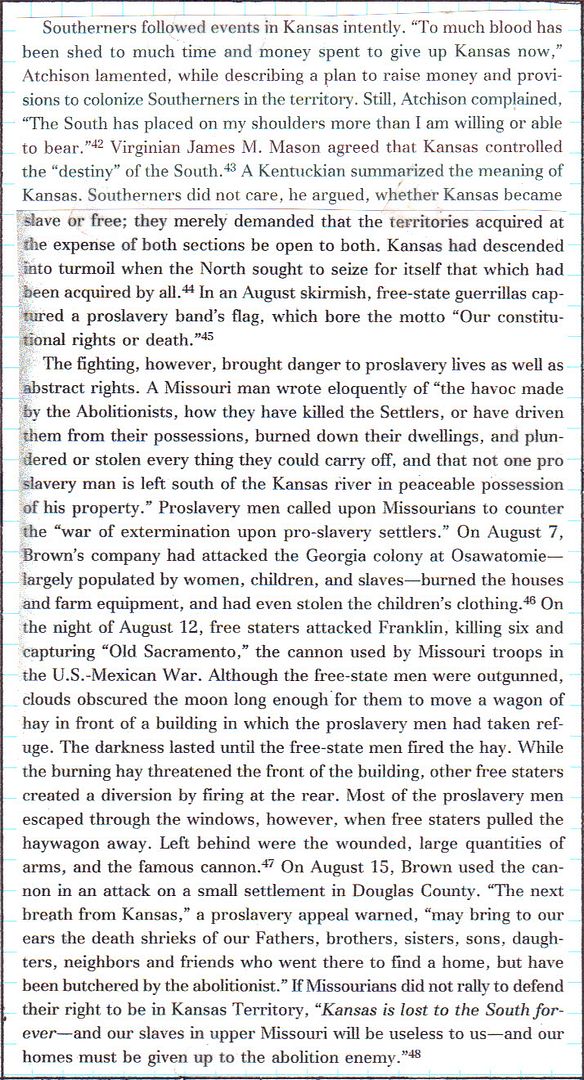
Nicole Etcheson, Bleeding Kansas: Contested Liberty in the Civil War Era
33 posted on
08/07/2016 7:15:07 AM PDT by
Homer_J_Simpson
("Every nation has the government that it deserves." - Joseph de Maistre (1753-1821))
To: chajin; henkster; CougarGA7; BroJoeK; central_va; Larry Lucido; wagglebee; Colonel_Flagg; Amagi; ...
Book report!

This biography has a different character than the others I have begun due to the fact that the historical record of Forrest’s life is skimpier than the rest. The biographer had to rely on the public record, mostly composed of legal notices, to trace the future general’s early life. That record is augmented by personal recollections of people who knew Forrest and had their memories recorded much later. Of course, there is also plenty of unverifiable legend surrounding this famous man. Jack Hurst has done a good job of sifting the available information and piecing together a picture of the origins of Nathan Bedford Forrest.
Forrest’s early life resembles Abraham Lincoln’s in the respect that both were born into harsh and primitive circumstances with families reliant upon subsistence farming for survival. Forrest, like Lincoln, received about 6 months of formal education. Unlike Lincoln, Forrest was fully satisfied with that and never yearned for more schooling. One result of that lack is that Forrest had no written correspondence with friends, relatives or business associates. That type of correspondence is a great source of material for biographers of more literary personalities.
Forrest was born July 13, 1821 and named for his paternal grandfather (Nathan) and the Tennessee county in which he was born (Bedford). A twin sister was also born, but she died young of typhoid fever, as did two other sisters and two of his eight younger brothers.
When he was a teen the family moved to Hernando, Mississippi. Like other people I have read about Forrest travelled south to take part in the Mexican War. In his case the effort came to naught because he did it in 1841, years before the war started. In order to earn return passage home he split rails. Around this time he began independent life by going into business selling agricultural products, such as seed and farm implements. This entailed becoming a slave trader in a small way. In 1852, seeing where the real money was to be made, he moved north to Memphis and went into the slave trading business full time.
The book then provides a good description of the sordid business of trafficking in human beings as it existed in the south in the first half of the nineteenth century. According to Forrest mythology he was especially humane to the slaves who passed through his hands, but Hurst shows that he probably was no better or worse than others in the trade. Forrest was a careful and thrifty businessman where his inventory was concerned. In connection with the slave business Forrest began to acquire farm lands as well as commercial property in Memphis. During slow times in the slave trading business he kept his stock productively occupied by raising cotton on his own property.
One way my knowledge is being enhanced during my reading – and this applies to all the books I have started – is that I am forced to refer to maps to understand the geography from the eastern mountains to the Mississippi Valley. The Mississippi River and other waterways play a vital role in the history we are covering and I find I don’t know as much about their courses as I thought. This deficiency is slowly being corrected.
Other vital events in Forrest’s pre-Civil War life were his marriage to Mary Ann Montgomery in 1845 and the death of a 6-year-old daughter, Fanny, in 1854. As Forrest becomes an increasingly prominent citizen of Memphis he will enter city politics, but that comes post-1856 and we will cover it later.
One part of the character of Nathan Bedford Forrest that became apparent even as a child is that he is not a person to be trifled with. Whether it is the panther that attacked and injured his mother when he was a boy or someone impugning his courage as a city councilman, he does not take injury sitting down.
I am only to page 67 of “Nathan Bedford Forrest: A Biography,” but based on the quality of what I have read so far I would recommend it to other readers.
92 posted on
08/23/2016 4:41:49 AM PDT by
Homer_J_Simpson
("Every nation has the government that it deserves." - Joseph de Maistre (1753-1821))
To: chajin; henkster; CougarGA7; BroJoeK; central_va; Larry Lucido; wagglebee; Colonel_Flagg; Amagi; ...
Book report!
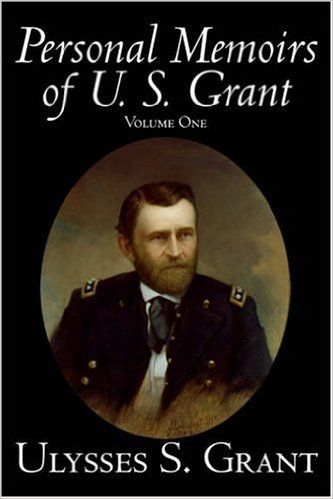
I still recommend the Grant biography by Jean Edward Smith that I reported on back in March (reply #93) , but you should read “Personal Memoirs of U.S. Grant” in conjunction with it. Of all the 19th century personalities I have read about this year Grant is the one I have come to like the most on the personal level. I got that from Smith’s book and “Memoirs” confirmed it. It also provides a look into his approach to life and sense of humor. He dwells on the positive and leaves out some of the negative things the later biographer wrote about. Of his resignation from the army – probably over an alcohol problem – and up until the Civil War grew near, he wrote very little. Given his sense of responsibility toward his family and his desire to succeed in life that was undoubtedly a very unhappy time for him. I don’t hold it against him at all that he danced lightly over that period in his memoirs, but I think his perseverance in a time of personal adversity shows his strength of character possibly more than he realized in his self-appraisal.
A question the Smith biography didn’t answer to my satisfaction is why Grant didn’t correct the error of changing his name from Hiram Ulysses Grant to Ulysses Simpson Grant on his entry to West Point. That was cleared up for the most part by Grant in the memoirs. He describes a conversation with his father about the appointment and quotes his father calling him “Ulysses.” So that is apparently how he was known in his family. That would make the change from Hiram U. to Ulysses S. less of an issue, so the unassuming young man would have been less likely to raise a fuss about it. He might also have figured the matter would have worked out to his benefit. The nickname obsessed cadets made hay of the “U.S.”, which no doubt played better than “H.U.G.” might have done.
Here is a quote from early in the book I found interesting:
The Southern rebellion was largely the outgrowth of the Mexican war. Nations, like individuals, are punished for their transgressions. We got our punishment in the most sanguinary and expensive war of modern times.
Volume One of Memoirs covers the period through October 16, 1863. Volume Two ends with the conclusion of hostilities and doesn’t cover Grant’s time as president.
95 posted on
08/27/2016 6:13:04 AM PDT by
Homer_J_Simpson
("Every nation has the government that it deserves." - Joseph de Maistre (1753-1821))
FreeRepublic.com is powered by software copyright 2000-2008 John Robinson








